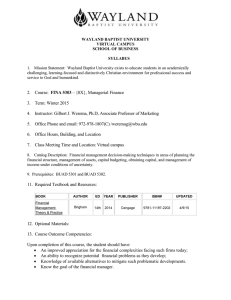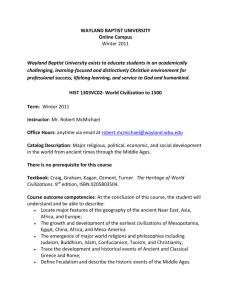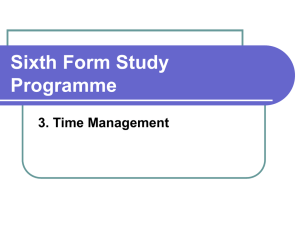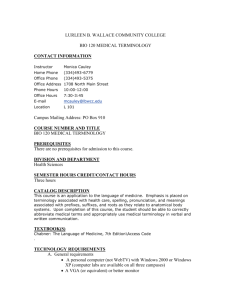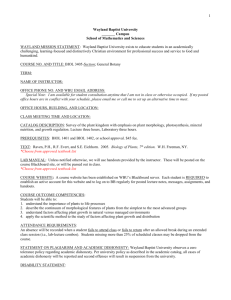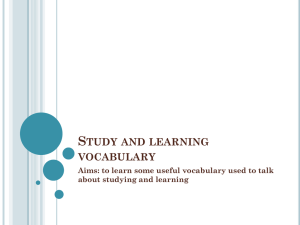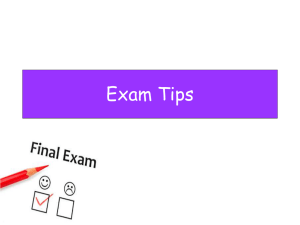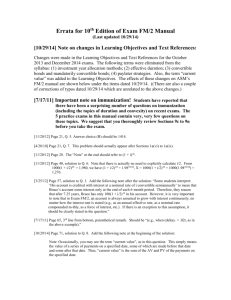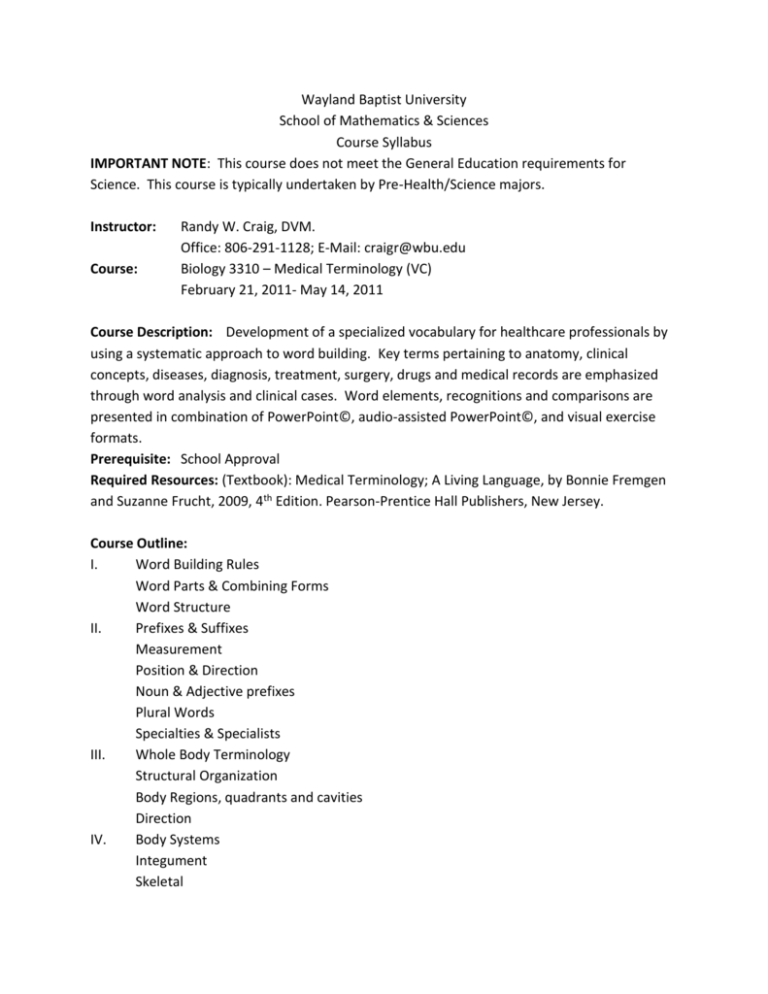
Wayland Baptist University
School of Mathematics & Sciences
Course Syllabus
IMPORTANT NOTE: This course does not meet the General Education requirements for
Science. This course is typically undertaken by Pre-Health/Science majors.
Instructor:
Course:
Randy W. Craig, DVM.
Office: 806-291-1128; E-Mail: craigr@wbu.edu
Biology 3310 – Medical Terminology (VC)
February 21, 2011- May 14, 2011
Course Description: Development of a specialized vocabulary for healthcare professionals by
using a systematic approach to word building. Key terms pertaining to anatomy, clinical
concepts, diseases, diagnosis, treatment, surgery, drugs and medical records are emphasized
through word analysis and clinical cases. Word elements, recognitions and comparisons are
presented in combination of PowerPoint©, audio-assisted PowerPoint©, and visual exercise
formats.
Prerequisite: School Approval
Required Resources: (Textbook): Medical Terminology; A Living Language, by Bonnie Fremgen
and Suzanne Frucht, 2009, 4th Edition. Pearson-Prentice Hall Publishers, New Jersey.
Course Outline:
I.
Word Building Rules
Word Parts & Combining Forms
Word Structure
II.
Prefixes & Suffixes
Measurement
Position & Direction
Noun & Adjective prefixes
Plural Words
Specialties & Specialists
III.
Whole Body Terminology
Structural Organization
Body Regions, quadrants and cavities
Direction
IV.
Body Systems
Integument
Skeletal
V.
VI.
VII.
VIII.
Muscles & Joints
Nervous & Special Senses
Blood and Lymphatic
Cardiovascular
Respiratory
Digestive
Endocrine
Reproduction: Male & Female
Anatomy & Physiology
Pathological Conditions
Sexually Transmitted Diseases
Family Health
Obstetrics
Child Growth & Development
Mental Health
Cancer Medicine
Cancer Terminology
Benign & Malignant
Neoplasia Classification
Pharmacology
Drug laws & Standards
Drug Sources
Drug Names
Outcome Competencies:
1.
The student will develop a professional vocabulary useful to communicating medical
concepts.
2.
The student will learn anatomical and clinical terms pertaining to body systems,
diseases, diagnosis and treatment, and surgery.
3.
The student will be able to recognize the categories of drugs, their actions, and methods
of administration.
4.
The student will be able to pronounce medical terms phonetically and to establish their
basic meanings through an analysis of their fundamental parts.
Course evaluation: University Grading System:
A
=
90-100
B
=
80-89
C
=
70-79
D
=
69-69
F
=
Below 60
I
=
Incomplete*
W
=
Withdrawal
* A grade of incomplete is changed if the deficiency is made up by midterm of the next
regular semester, otherwise, it becomes an “F”. The grade(I) is given only if circumstances
beyond the student’s control prevented completion of work during the semester enrolled and
participation requirements have been met.
Examinations/Quizzes:
The study of Medical Terminology allows the student to develop the skills to build thousands of
vocabulary words. There will be two(2)short exams given during the duration of the course.
These two(2) exams will constitute fifty percent(50%) of the course grade. There will be
several, one(1) for each chapter, short quizzes throughout the course, which will constitute
twenty percent (20%) of the course grade. The final comprehensive exam will constitute
twenty percent (20%) of the course grade. The remaining 10% of the course grade will be based
upon practice exercises from each chapter. Unit and Final exams are set to be completed in
allotted times, points(1pt/minute) will be deducted from the exam score for completion times
exceeding the allotted time. These exams are not designed as open-book exams, thus there is
ample time to complete each exam provided adequate preparations and study have been done.
There will not be enough time to complete these exams if students attempt to lookup each
question.
Course Communications:
The official means of student communication for the course is via course blog areas and/or
assigned student Wayland Baptist University E-mail addresses.
Note:
In compliance with the Americans with Disabilities Act of 1990(ADA), it is the policy of Wayland
Baptist University that no otherwise qualified person with a disability be excluded from
participation in, be denied the benefits of, or be subject to discrimination under any
educational program or activity in the university. The Coordinator of Counseling Services serves
as the coordinator of students with a disability and should be contacted concerning initial
enrollment, scheduling and requests for accommodations. It is the student’s responsibility to
initiate contact with the coordinator of counseling services and it is to the student’s advantage
to do so as soon as possible before registration to ensure that any accommodations requested
are delivered in a timely manner.
Revised 1-10-2011

